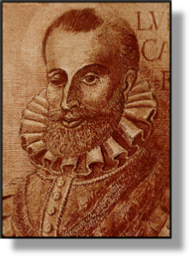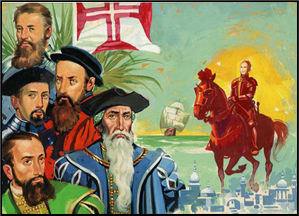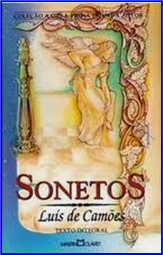


xxxxxLuís de Camoens, one of Portugal’s greatest poets, led an eventful life as a soldier, much of it fighting in North Africa and the Far East. It was while in the Orient that he wrote his country’s national epic Os Lusíadas (The Lusiads), centred around Vasco da Gama’s historical voyage to India, but containing heroic deeds of other Portuguese adventurers. This work, published in 1572, did much to maintain the national spirit of his people, but it made him little money, and he died in poverty and obscurity. He wrote a large number of odes, elegies and sonnets. Many had a romantic theme, but some were the product of anguish and genuine suffering, and it is in these that his verse excels.
LUÍS DE CAMOENS
1524 -
Acknowledgements
Camoens: by the
Portuguese artist Fernäo Gomes (1548-
 xxxxxOs Lusíadas (The
Lusiads), a long narrative poem which tells of the
voyages of his fellow countryman Vasco da Gama and other
Portuguese heroic events -
xxxxxOs Lusíadas (The
Lusiads), a long narrative poem which tells of the
voyages of his fellow countryman Vasco da Gama and other
Portuguese heroic events -
xxxxxCamoens,
one of the greatest of Portuguese poets, lived an eventful life.
He was probably born in Lisbon, and it is known that he worked as
a tutor at the court of John III. It was there that his adventures
began. His affair with one of the queen's ladies-

xxxxxHe arrived
home in 1570, broken in health and with little more in his pocket
than the manuscript of The Lusiads. It
was published two years later, bringing him fame but not much of a
fortune -
xxxxxThe Lusiads, which means The Portuguese (from the ancient Roman name for Portugal, Lusitania) was based on the format of both Vergil's epic The Aeneid, and the romantic epic Orlando furioso, written by the Italian Ludovico Ariosto in 1516. As stated, the central theme of the work is Vasco da Gama's historical voyage to India, an adventure steeped in mythology and around which Camoens weaves glowing references to other heroic deeds of his people. Included, for example, is the Portuguese sea captain Lourenco de Almeida, who founded a settlement at Colombo in 1505 and died bravely in battle three years later (1508 H7). But the poem is not devoid of criticism. It contains some bitter comment concerning the harsh rule of his people in their role as colonial masters.

xxxxxDuring his
extensive travels he also wrote some delightfully structured
verse, much of it published after his death in the form of odes,
elegies and sonnets. There is much on romantic themes -
xxxxxIncidentally, in 1639 the Portuguese poet and literary critic Manuel de Faria e Sousa
(1590-
L1-


